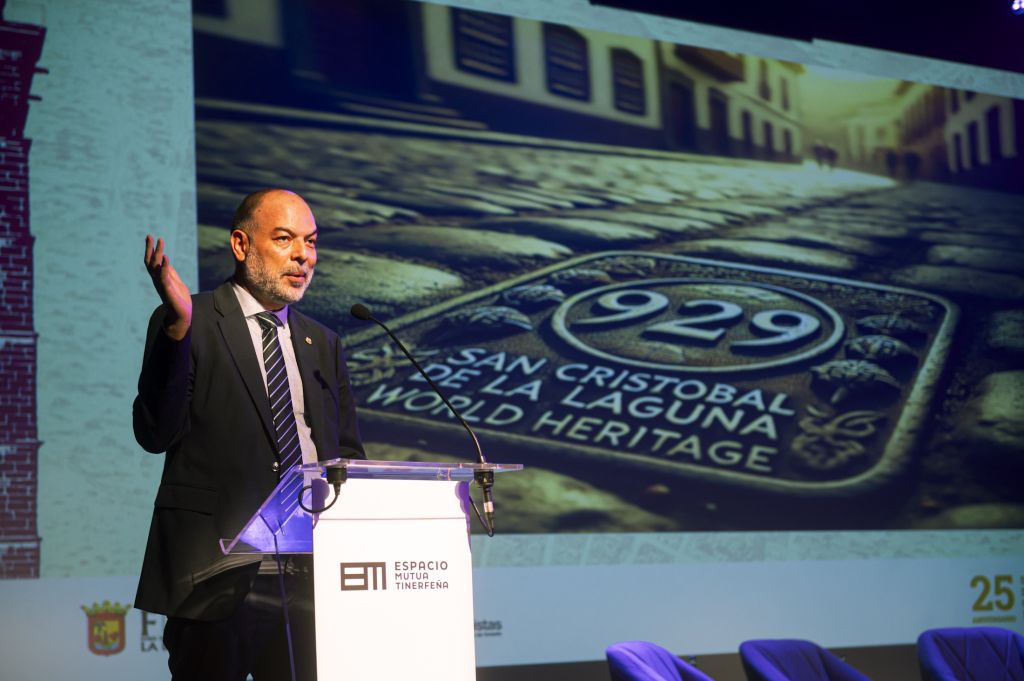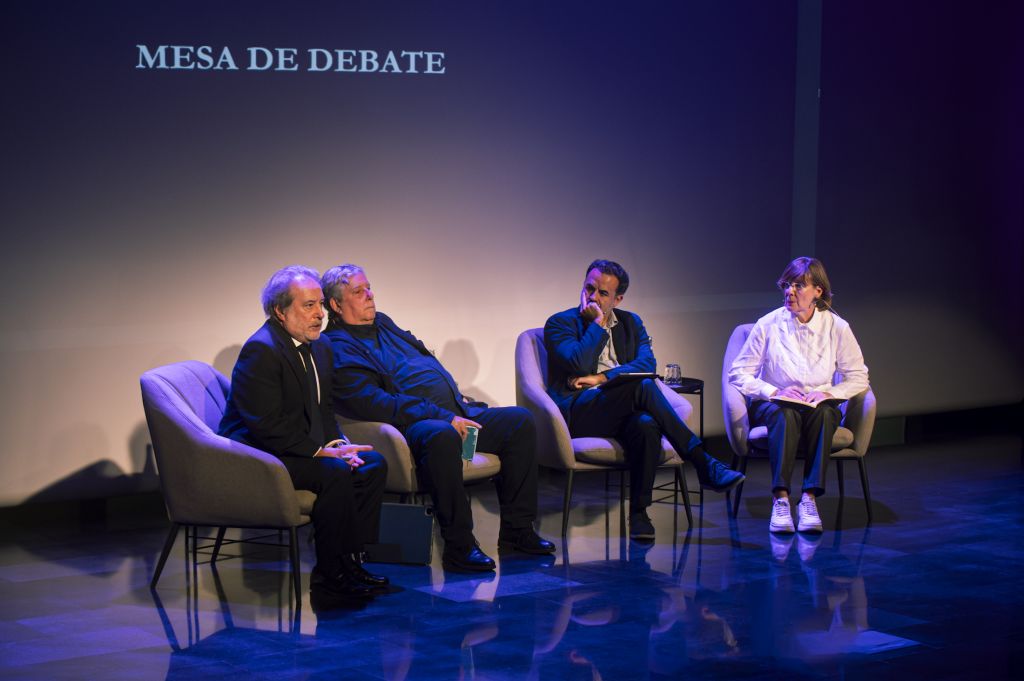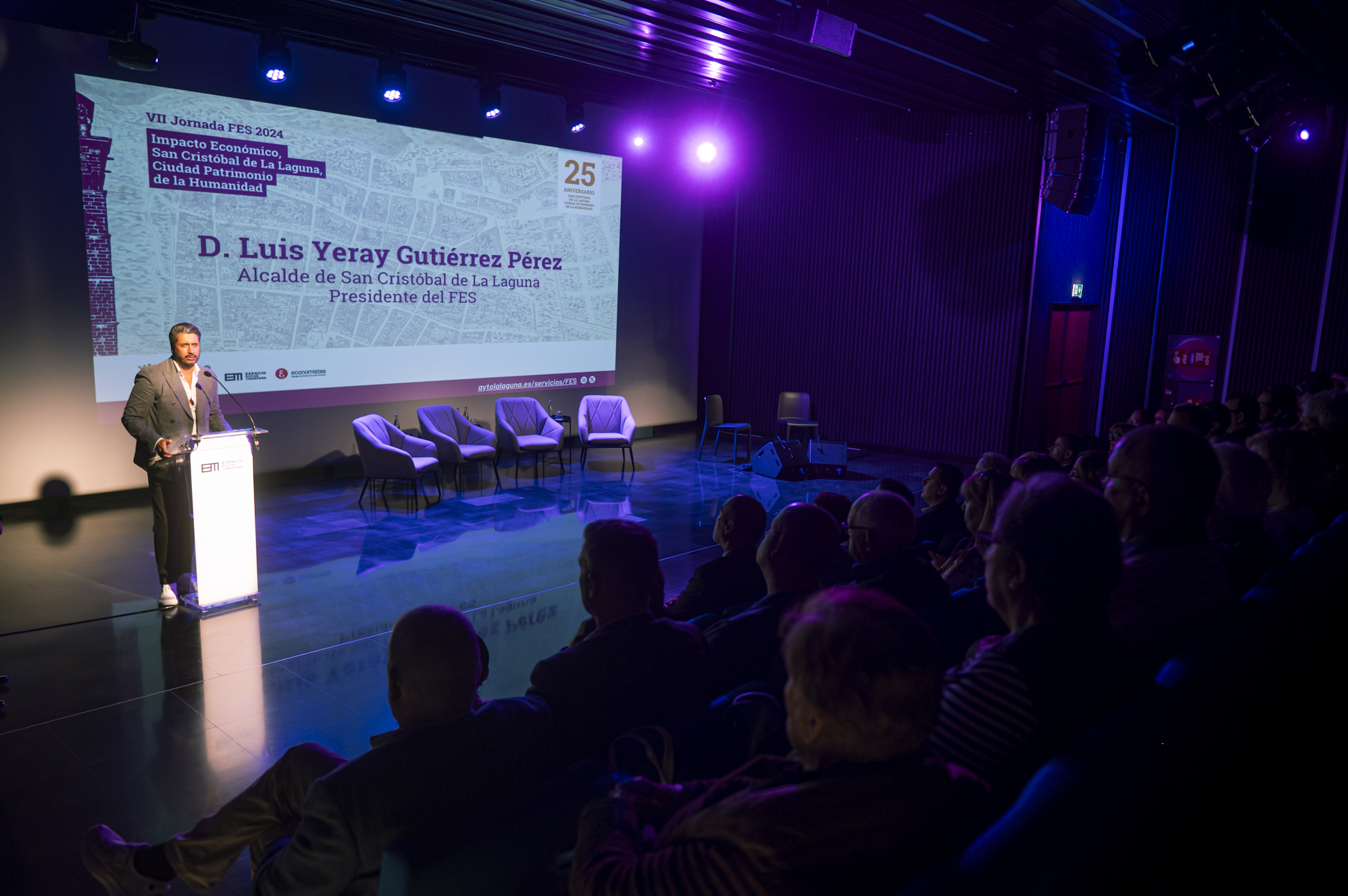This research by the Economic and Social Forum and the Official Association of Economists of the province allows to analyse 25 years of development and explore future opportunities and challenges.
 The Economic and Social Forum (FES) of La Laguna and the Official Association of Economists of Santa Cruz de Tenerife have presented this afternoon the first study on the ‘Economic Impact of the declaration of La Laguna as a World Heritage City by Unesco’, a research that has been collected in a book and that explores the opportunities and challenges that this designation has meant for the local and regional economy; changes in investment patterns, tourism, trade, commerce, tourism and tourism.has meant for the local and regional economy; the changes in the patterns of investment, tourism, trade and employment that have been observed in these years, as well as the challenges, formulas and policies that can serve as an impetus for La Laguna to take full advantage of this heritage status in the coming decades.
The Economic and Social Forum (FES) of La Laguna and the Official Association of Economists of Santa Cruz de Tenerife have presented this afternoon the first study on the ‘Economic Impact of the declaration of La Laguna as a World Heritage City by Unesco’, a research that has been collected in a book and that explores the opportunities and challenges that this designation has meant for the local and regional economy; changes in investment patterns, tourism, trade, commerce, tourism and tourism.has meant for the local and regional economy; the changes in the patterns of investment, tourism, trade and employment that have been observed in these years, as well as the challenges, formulas and policies that can serve as an impetus for La Laguna to take full advantage of this heritage status in the coming decades.
The Mayor of La Laguna, Luis Yeray Gutiérrez, and the technical secretary of the College, Juan José Hernández Castro, were responsible for presenting the results of an analysis to the nearly 200 people in attendance, which provides the municipality with a global and neutral view of the economic consequences of recognition by Unesco, which on 4 December celebrates its 25th anniversary.
This publication is the result of a transversal work with multiple sectors and institutions, not only economic, but also cultural, social and neighbourhood ones. Taking a critical approach, it examines the direct and indirect effects of the heritage declaration on the economy of La Laguna, with special reference to the tourism sector, and explores issues such as the challenges of heritage preservation, the involvement of local actors and the sustainability of cultural and economic development policies.
The mayor of La Laguna and president of the local FES, Luis Yeray Gutiérrez, explained that this report “is the result of an exhaustive analysis that allows us to understand, with greater precision, the impact that this recognition has had on our city. This document not only reflects the tourism and economic growth we have experienced, but also how this has influenced the life of the citizens, the conservation of our heritage and the sustainable development of La Laguna”.
“With the experience and the road travelled in these 25 years, we still have challenges to face in order to build the future of a city that is the heritage of all Canary Islanders. And we must continue to work together, both institutions and citizens, to ensure that La Laguna continues to be a benchmark for heritage conservation, economic dynamism and social cohesion,” said the mayor.
For her part, the vice-president of the FES, Josefina Suárez, recalled that this study, carried out through the analysis of data, interviews and case studies, aims to “enable citizens and public decision-makers to make informed decisions about the economic and cultural future of our city. Furthermore, we are confident that this work will serve as a resource for future economic development strategies in heritage contexts”.
The Dean of the Official Association of Economists of Santa Cruz de Tenerife, José Luis Casajuana, said that the repercussions of inclusion on the UNESCO list is a subject that, “despite its relevance, has been scarcely studied in a comprehensive manner and with a multidisciplinary approach that, as in this case, brings together economic, social, cultural and historical perspectives”.
The study presented today, he added, “not only brings us conceptually closer to the impacts of the declaration as a World Heritage Site, but also invites us to reflect on the role that heritage plays in our identity and everyday life; on whether we have taken full advantage of UNESCO’s distinction or whether we have missed opportunities for growth and development”.
Conclusions
This analysis delves into the benefits of World Heritage status over the past 25 years, where La Laguna has experienced an increase in tourism, which has generated direct and indirect economic benefits, such as job creation and increased investment in commerce, culture and services.
Thus, he concludes that the declaration has supported the local economy and promoted community engagement with heritage. However, it notes that tourism growth poses challenges, such as saturation and the risk of loss of authenticity in some areas.
Furthermore, it recalls that the conservation of Outstanding Universal Value (OUV) requires not only the preservation of physical infrastructure, but also the cultural and social practices that connect the community to its heritage. This poses significant administrative challenges, as the dispersion of competences and the lack of centralised data hinder effective management and the accurate assessment of their economic and social impact.
Recommendations
The report’s recommendations include the creation of a Central Management Body, a central entity to coordinate the preservation, promotion and development of La Laguna’s heritage. This body should adopt a multidisciplinary approach encompassing cultural, economic and social aspects of conservation.
It also raises the need to implement tools to continuously assess compliance with conservation regulations and to make periodic adjustments in response to changes in the environment and in the needs of the community. To this it adds the promotion of research and access to data on these matters, strengthening academic collaboration and fostering institutional transparency and cooperation.
It also recommends promoting a sustainability strategy that limits saturation and encourages respectful tourism practices, ensuring a balance between economic development and heritage conservation. In this sense, it suggests a shared work with the management practices of other World Heritage cities, to facilitate the development of more effective preservation strategies adapted to the reality of La Laguna.
In relation to these latter aspects, the mayor recalled that La Laguna is finalising its Urban Agenda model and the documents for tendering the drafts of the Action Plan for the Historic City and the update of the Special Plan for the Protection of the Historic Site.
He also pointed out that La Laguna is actively working in the Group of World Heritage Cities of Spain, in whose last General Assembly (held on 9 November) “we have approved a multi-year Strategic Plan, a roadmap focused on sustainability and which will allow us to work together to face, in a way adapted to each reality, the challenges in areas such as housing and habitability in historic cities, the revitalisation of trade, technological development, changes in the tourism sector or the conservation and dissemination of our heritage and culture”.
Round table debate
 This presentation of the Economic Impact report was included in the VII Conference organised by the FES this 2024, a meeting which also included a round table debate on the challenges and opportunities for the only World Heritage City in the Canary Islands. Participants included María Isabel Navarro Segura, Professor of Art History at the University of La Laguna (ULL); José Juan Cano Delgado, co-director of the ULL’s “La Laguna World Heritage” Cultural Chair; Juan Manuel Palerm Salazar, Professor of Architectural Projects at the University of Las Palmas de Gran Canaria; and José Luis Rivero Ceballos, Professor of Applied Economics at the ULL.
This presentation of the Economic Impact report was included in the VII Conference organised by the FES this 2024, a meeting which also included a round table debate on the challenges and opportunities for the only World Heritage City in the Canary Islands. Participants included María Isabel Navarro Segura, Professor of Art History at the University of La Laguna (ULL); José Juan Cano Delgado, co-director of the ULL’s “La Laguna World Heritage” Cultural Chair; Juan Manuel Palerm Salazar, Professor of Architectural Projects at the University of Las Palmas de Gran Canaria; and José Luis Rivero Ceballos, Professor of Applied Economics at the ULL.
The conference, which was attended by 180 people at the Espacio Mutua Tinerfeña in the town and which filled its capacity days in advance, was broadcast live on the YouTube channel of the City Council of La Laguna, where it will be available for those interested.
The digital version of the study will also be available on the municipal website, while the physical edition, which was sent to all those attending, will be distributed among the different institutions present in the municipality.



